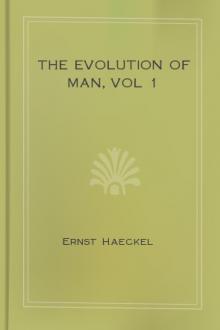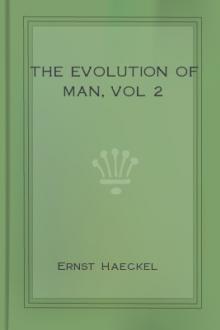Freedom in Science and Teaching. by Ernst Haeckel (my reading book txt) 📕

- Author: Ernst Haeckel
- Performer: -
Book online «Freedom in Science and Teaching. by Ernst Haeckel (my reading book txt) 📕». Author Ernst Haeckel
The individual development or ontogenesis of each of these many-celled animal-forms, brings this histological process of development so clearly and evidently before our eyes that we can but directly infer from it the truth of the phylogenesis, or gradual historical evolution of the soul-organs. The association of cells and the division of labour among them are the modes by which, in the first instance, the compound many-celled organism has originated, historically, from the simple one-celled organism. And an impartial comparative consideration teaches us in the clearest way that a functional-activity of the soul-cells exists in the lowest one-celled animals as well as in the highest and many-celled; in the infusoria as well as in man. Volition and sensation, the universal and unmistakable signs of soul-life, may be observed among the former as well as in the latter. Voluntary motion and conscious sensation (of pressure, light, warmth, &c.) come under our observation so undoubtedly in the commonest forms of infusorial animals—for instance the Ciliata, that one of their most persevering observers, Ehrenberg, asserted undeviatingly to the day of his death that all Infusoria must possess nerves and muscles, organs of sense and of soul, as well as the higher animals.
It is well known that the enormous advance which our science has lately made in the natural history of these lowest organisms culminates in the statement—clearly made by Siebold thirty years since, but only recently "ascertained as proved"—that these minute creatures are one-celled, and that in the case of these infusoria one single cell is capable of all the various vital functions—including soul-functions—which in the zoophytes (plant-animals), as the hydra and the sponges, are distributed among the cells of the two germ-layers, and in all the higher animals among the different tissues, organs, and apparatus of a highly developed and constructed organism. The psychic functions of sensation and voluntary motion, which are here distributed to such very various organs and tissues, are in the infusoria fulfilled by the neutral plasson material of the cell, by the protoplasma, and possibly also by the nucleus (compare my treatise "The Morphology of the Infusoria." Jena, Zeitschriften, 1873, vol. vii. p. 516). And just as we must attribute to these primary animal forms an independent "soul," just as we must plainly be convinced that the single independent cell has a "psyche," we must as decidedly attribute a soul to every other cell; for the most important active constituent of the cell, the protoplasm, everywhere exhibits the same psychic properties of sensibility or irritability, and motive power or will. The only difference is this, that in the organism of the higher animals and plants the numerous collected cells, to a great extent, give up their individual independence, and are subject, like good citizens, to the soul-polity which represents the unity of the will and sensations in the cell community. We here also must distinguish clearly between the central soul of the whole many-celled organism or the personal psyche (the person-soul), and the particular individual soul or elementary soul of the individual cells constituting that organism (the cell-soul). Their relations are strikingly illustrated in the instructive group of Siphonophora, as I have briefly shown in my article on "The Cell-soul and Soul-cells" (Deutsche Rundschau, July 1878). Beyond a doubt the whole stock or polity of Siphonophora has a very definite united will and a united sensibility, and yet each of the individual persons of which this stock (or Cormus) is composed has its own personal will and its own particular sensations. Each of these persons indeed was originally a separate Medusa, and the individual Siphonophora stock originated, by association and division of labour, out of these united Medusa communities.
When I developed this theory of the cell-soul and designated it in my Munich address as the "surest foundation of empirical psychology," I believed I was drawing an inference quite to Virchow's mind, from his own views of mechanical and cellular-physiology; and for that reason I took the same occasion specially to celebrate his very great services to the cell theory. How astonished then was I when in his reply this very theory was violently attacked and satirised as "mere trifling with words." It never could have occurred to me that Virchow had long since become unfaithful to his most important biological principles, and had deserted his own mechanical "theory of cells;" it never had occurred to me that Virchow could be in great measure wanting in that zoological knowledge which is requisite for a practical comprehension of the cell-soul theory. He has never thoroughly studied either the one-celled Protozoa, the Infusoria and Lobosa, nor the Coelenterata, the highly instructive Sponges, Hydroids, Medusæ, or Siphonophora; and thus he is wanting in those genetic principles of comparative zoology on which our theory rests. It is in no other way conceivable that Virchow should contemn the most important consequences of the cell theory as "mere trifling with words."
Next to the one-celled infusoria no phenomenon throws such direct light on our cellular psychology as the fact that the human ovum, like the ova of all other animals, is a single, simple cell. In accordance with our monistic conception of the cell-soul, we must conclude that the fertilised ovum-cell already virtually possesses those psychical properties which, by the special combination of the peculiarities inherited from both parents, characterise the individual soul of the new person; in the course of the development of the germ, the cell-soul of the fertilised ovum naturally is developed simultaneously with its material substratum, and subsequently, after birth, it appears in full activity.
According to Virchow's dualistic conception of the psyche, we must, on the contrary, assume that this immaterial essence at some period of its embryonic development (apparently when the spine separates itself from the external germ-layer) informs the soulless germ. Of course, the bare miracle is thus complete, and the natural and unbroken continuity of development is superfluous.
CHAPTER V. THE GENETIC AND DOGMATIC METHODS OF TEACHING.The very justifiable surprise which Virchow's Munich address has excited in many circles is due only in part to his opposition to the theory of descent; for the rest, and in much greater part, it is due to the astounding arguments which he has connected with it, particularly as to freedom for instruction. These arguments so closely resemble those of the Jesuits that they might have been inspired direct from the Vatican, or, which is the same thing, the notorious "court-chaplain party" in Berlin. No wonder, then, that these propositions, which would undermine the whole liberty of science, have met with the loudest approbation from the "Germania," the "New Evangelical Church Times" ("Neue Evangelischen Kirchenzeitung"), and other leading, equivocating organs of the Church militant. On the other hand, these odious principles are already so extensively discussed, and have been so clearly laid down in all their indefensibility, that I may here deal with them briefly.
Virchow's politics as a pedagogue reach their highest pitch in this demand: "that in all schools, from the poor schools to the universities, nothing shall be taught that is not absolutely certain. None but objective and absolutely ascertained knowledge is to be imparted by the teacher to the learner; nothing subjective, no knowledge that is open to correction, only facts, no hypotheses." The investigation of such problems as the whole nation may be interested in must not be restricted; that is liberty of inquiry; but the problem ought not, without anything farther, to be the subject of teaching. "When we teach we must restrict ourselves to the smaller, and yet how great, departments which we are actually masters of."
Rarely indeed has such a treasonable attempt on liberty of doctrine been made by a prominent representative of science, and a leader of the intellectual movement too, as this by Virchow. Only inquiry is to be free and not teaching! And where in the whole history of science is there one single scientific inquirer to be found who would not have felt himself quite justified in teaching his own subjective convictions with as much right as he had to construct them from inquiry into objective facts. And where, generally speaking, is the limit to be found between objective and subjective knowledge? Is there, in fact, any objective science?
This question Virchow answers in the affirmative, for he goes on to say: "We must not forget that there is a boundary line between the speculative departments of natural science and those that are actually conquered and firmly established" (p. 8). In my opinion, there is no such boundary line; on the contrary, all human knowledge as such is subjective. An objective science which consists merely of facts without any subjective theories is inconceivable. For evidence in favour of this view we must take a rapid survey of the whole domain of human science, and test the chief departments of it to see how far they contain, on the one hand, objective knowledge and facts, and on the other, subjective knowledge and hypotheses. We may begin directly with Kant's assertion that in every science only so much true—that is objective—knowledge is to be found as it contains of mathematics. Unquestionably mathematics stand at the head of all the sciences as regards the certainty of its teaching. But how as to those deepest and simplest fundamental axioms which constitute the firm basis on which the proud edifice of mathematical teaching rests? Are these certain and proved? Certainly not. The bases of its teaching are simply "axioms" which are incapable of proof. To give only one example of how the very first principles of mathematics might be attacked by scepticism and shaken by philosophical speculation, we may remember the recent discussions as to the three dimensions of space and the possibility of a fourth dimension; disputes which are carried on even at the present day by the most eminent mathematicians, physicists, and philosophers. So much as this is certain, that mathematics as little constitute an absolutely objective science as any other, but by the very nature of man are subjectively conditioned. A man's subjective power of knowing can only discern the objective facts of the outer world in general so far as his organs of sense and his brain admit in his own individual degree of cultivation.
However, granting that mathematics practically constitute an absolutely certain and objective science, how is it with the rest of the sciences? Undoubtedly the most certain among them are those "exact sciences" whose principles are to be directly proved by mathematics; thus, in the first place, a great part of physics. We say, "a great part," for another large part—to speak accurately, by far the greatest—is incapable of any exact mathematical proof. For what do we know for certain of the essential nature of matter, or the essential nature of force? What do we know





Comments (0)